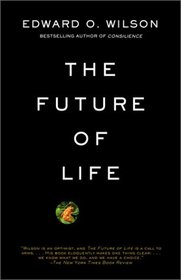I first heard about Edward Osborne ("E.O.") Wilson from a 2007 interview with Bill Moyers. This is another of the books on science I've discussed. As I was listening to it, I wondered what humans fifty years from now, assuming humanity survives, will think about the humans who preferred acquiring consumer goods over preserving our planet's biodiversity? Or worse, the humans who were too busy killing each other, most assuredly for justifiable reasons, to notice that the planet was preparing to cull its most destructive species, home sapiens? Or even more unfathomable, large swaths of humanity spent all their time and effort worrying about which humans were indeed closer to God and immersed themselves in endless disputes over texts whose authors would be horrified that their works were cited as reasons for ego-assuaging religious one-upmanship. In high school, I dabbled in forensic 2-peson policy debate. Every policy (or failure to enact a policy) would result in global thermonuclear war or species extinction, and it was a toss-up which one was worse. This book helps you understand why species extinction is happening, the incredibly serious consequences for the viability of the human species, the extent of aesthetic loss in our lives and efforts and strategies which show the greatest promise in slowing the rate of species extinction. There were a few points which stuck in my craw, and I list them here with the caveat that I'm no specialist or expert. The underlying assumption of the range of solutions is that no solution which challenges the dominance of techno-capitalism is viable. In fact, Only the Super-Rich Can Save Us, through their participation in reserve-creating non-governmental organizations, in some of which Professor Wilson participated. The world's poor are a threat to be managed. He doesn't say this, but their only agency in this story is that they stop reproducing so quickly and that they accept NGO bribes to preserve their forests. I would have liked Professor Wilson to mention that the United States and other governments of the industrialized nations support the militaries which protect the oligarchies and multi-national corporations which plunder the resources of the planet, suppress indigenous peoples and labor unions and perpetuate poverty, when these governments are not knee-deep in wars and occupation in mineral-rich regions of Asia, Africa and the Americas. Nevertheless, I do believe doing something is better than doing nothing, and it seems like our ecological consciousness had not matured to the point where we can set our thermostats to 68 in winter, stop eating industrially-produced poultry or even deep-sea drilling after BP's disaster in the Gulf of Mexico. So maybe the best we can do for now is praise the super-rich. Note that I have not even fully implemented a recycling program at my house, so the preceding passages were quite a hypocritical rant! Despite these reservations about Professor Wilson's presentation of political economy, this book is tremendously important for its presentation to the layman of the ecological situation and the components of an environmental ethic which would lay the foundation for changing human behavior.
Book Reviews of The Future of Life
|
|
The Future of Life Author:
|
3 Book Reviews submitted by our Members...sorted by voted most helpful
He's a microbiologist, so the interesting parts are about the little guys. Much of the rest has been written about more recently (I guess that's to his credit), but not a lot on global warming. He's a pretty entertaining writer.
A bit hard to read. His theory is that even though we are in the process of ruining what is left of the wild earth, he thinks that if we throw enough money at it, things can be reversed.




